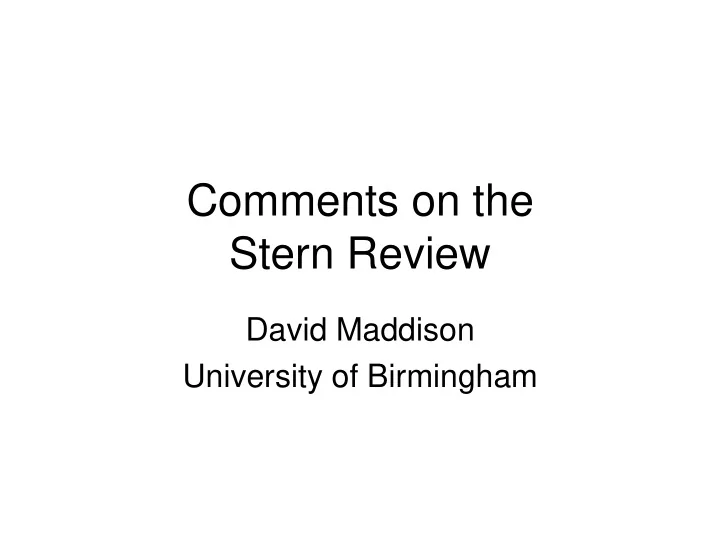

Comments on the Stern Review David Maddison University of Birmingham
The Stern Review • The 575 page Stern Review on the Economics of Climate Change was published on the 30 th October • The Review was embraced by political leaders of all the main parties but shortly afterwards criticised by several leading economists
What does it say? • Impact of climate change equivalent to a 5-20% cut in consumption now and forever • Recommends stabilising atmospheric concentrations at 550ppm CO 2 equivalent • Marginal damage costs equal to $314/tC • Emissions can be stabilised at 1% of GDP
Why the big difference? • Did earlier economic analyses neglected important aspects? • Has the underlying scientific / economic literature has moved on? • Does the Stern Review contains errors / points of contention?
For the avoidance of doubt • My critique deals with chapters 4 to 13 • Some of my criticisms would point to greater action than that recommended by Stern • There have been several postscripts since the Stern Review was released • My own thinking on the Stern Review has also evolved through time
Damage costs • Uncertainty and risk aversion are at the heart of Stern’s analysis and climate assumptions are updated • The Review uses the PAGE2002 Integrated Assessment Model to calculate damage costs • Use of the A2 emissions scenario is unexplained
Damage costs • Assumed damage cost estimates for catastrophic impacts • Damage cost estimates are all pre 2001 • The Review appears to favour the use of equity weights without reminding the reader about arguments against their use
Potentially misleading? • Stern says: “The most severe climate impacts… reduce consumption to such low levels” and “Climate change causes a reduction in consumption of 5-20% now and forever” (italics added) • The most severe climate impacts involve a reduction in global GDP per capita of 35.2% by 2200 but according to Stern GDP per capita will still be 8 times higher
Abatement costs • Abatement cost estimates based on consensus estimates • Have the external costs of renewable energy been everywhere included? • Argues in favour of energy efficiency as a means to reduce emissions • Assumes that halting tropical deforestation entails an opportunity cost
Optimal control • Stern acknowledges the role of benefit cost analysis • Does not locate the optimal control only a strategy for which the benefits outweigh the costs • Accounts for uncertainty but fails to acknowledge the impact that future learning has on near term decisions
Discounting the future • There are two reasons for discounting in economics: – Pure time impatience – Declining marginal utility combined with assumed economic growth • Previous economic analyses assumed a constant discount rate for evaluating projects to slow climate change
Discounting the future • Stern ignores impatience resulting in a low discount rate and treats economic growth as endogenous • The chosen discount rate does not appear to rationalise current economic behaviour • Stern’s choice of a single discount rate reduces what is essentially an ethical decision to a pure economic parameter
Conclusions • The most important thing about the Stern Review was that it was commissioned in the first place • The Review would have benefited from more extensive independent peer review • It is possible to believe that climate change is a serious threat and yet not wholly subscribe to the economics of the Stern Review
Recommend
More recommend